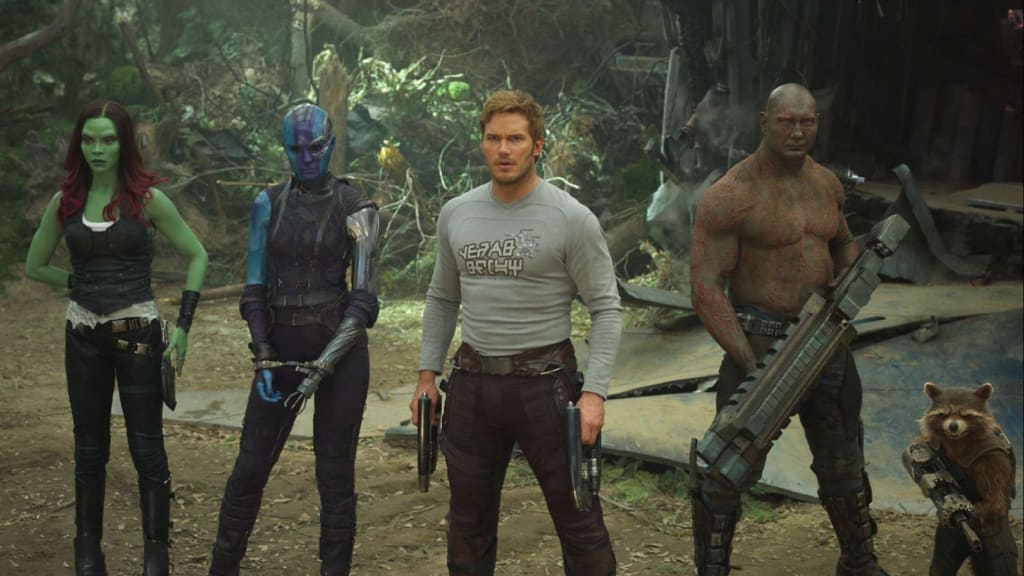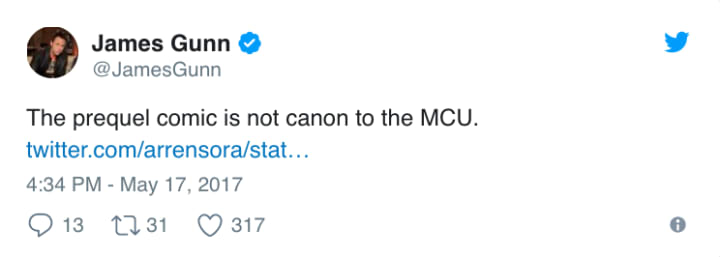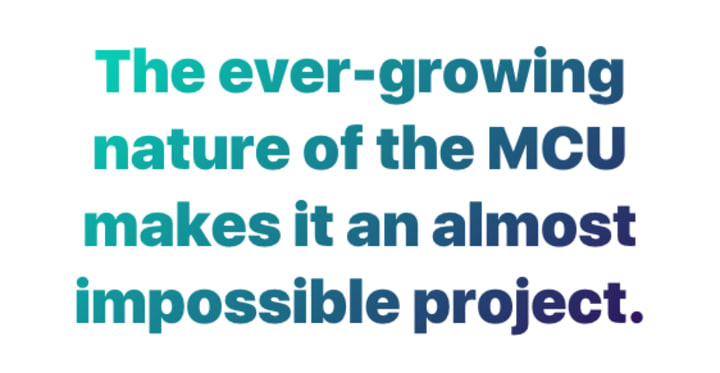
Back when #Marvel launched their Cinematic Universe in 2008, they could hardly have expected it to become such a success. Now, the MCU stretches far beyond movies; it embraces a wider world of one-shots, TV shows, tie-in comics, and even YouTube promotions. The problem is, though, that continuity is becoming ever-harder to maintain. How long can the idea of this shared universe survive?
That question's just become a lot more pressing, as #JamesGunn, director of #GuardiansOfTheGalaxy2, just erased a tie-in comic from the canon.
The Guardians of The Galaxy prelude comic is no longer Canon.

Image via Twitter
Recently, Twitter user A. Soren noticed a plot hole in the MCU continuity: the Guardians of the Galaxy Prelude comic actually contradicts the sequel. It presents the backstory of Gamora and Nebula, and even shows how Nebula becomes increasingly cybernetic — right down to Thanos and Gamora putting her in a position where she has to cut off her own arm. In contrast, in Guardians of the Galaxy Vol. 2 we learn that Thanos made his children spar against one another, with the loser also losing a body part as punishment. Worse still, there are strong rumors that the Black Order — Thanos's sworn servants from the comics — will appear in Avengers: Infinity War as his other "children," meaning the contradiction is likely to get worse.
When Soren asked Guardians director James Gunn about this seeming continuity error, Gunn offered a simple solution. He confirmed that the Guardians tie-in comic is no longer part of the MCU continuity — although in comments, he later clarified that he can only speak for the Guardians tie-ins.
The complexity of the shared universe is a problem.
This is only the second example of a major piece of Marvel content becoming non-canon (the Agent Carter one-shot was removed because it was set one year after the Second World War, which directly contradicted the chronology of Agent Carter). And yet, these rare examples highlight the very real challenge of keeping such a complex continuity straight across a range of media.
The problem affects more than just the comics. Fans have long fumed at the fact that the TV shows get no recognition in the movies, while the Netflix showrunners are carefully timing their series so as to avoid the Sokovia Accords. The Defenders is set in early 2016, a couple of months after the events of Daredevil Season 2, but the Netflix shows are running out of wiggle-room. Sooner or later, they're going to have to deal with the fallout from the Sokovia Accords, which would force most of their heroes to register with the United Nations (Daredevil being a likely exception, as only his closest allies know he even has powers in the first place).
With ever more TV shows set for release — The Inhumans airs later this year, and we're eagerly awaiting Cloak and Dagger, Runaways, and New Warriors — this problem is only going to get worse.
A Structural Issue
The gold standard is cinematic universes, of course, is Lucasfilm, whose overarching continuity is watched over by the Lucasfilm Story Group. Marvel, however, could never implement the same solution; the company just isn't structured in such a way as to make this possible. Back in 2015, office politics led to Disney forcing a major reorganization of Marvel. Marvel Studios was pulled out of the broader Marvel Entertainment as a separate Disney subsidiary, run by Kevin Feige. Now, Marvel Studios and Marvel Entertainment are separate groups; sure, they're strong stakeholders in one another's businesses, but they don't have any connection in structural terms.
Marvel Studios, in particular, doesn't seem too concerned with cooperating with Marvel Entertainment. The latter only get properties when Marvel Studios has passed up on them (hence The Inhumans TV series, after Marvel Studios canceled the movie). Meanwhile, this year's official tie-in comics have essentially been retellings of the movies, with a couple of extra panels if we're lucky. To fans, it's seemed to symbolize the growing distance between Marvel Studios and Marvel Entertainment — and James Gunn wiping an entire tie-in comic out of continuity is yet more evidence of the problem.
Can the problem be resolved?
Realistically, the continued expansion of the MCU makes it an almost impossible project. There are only two possible solutions. The first is yet another major structural reorganization, drawing Marvel Studios and Marvel Entertainment back together, and establishing some sort coordinating body to oversee continuity. That's a suggestion offered by MCUExchange (although, to be fair, they focus on the need for a sort of "continuity master" role, and don't recognize the structural changes that would be needed in order to implement this).

I doubt that's likely to happen, at least not unless key figures over at Marvel Entertainment (most notably the controversial CEO Ike Perlmutter) move on. Conflict between Perlmutter and Feige was the trigger for Disney's splitting the company apart in the first place, with Feige reportedly threatening to quit over Perlmutter's interference.
The second, and more likely, possibility is a subtle one. Kevin Feige has openly discussed the possibility of abandoning Marvel's traditional "phases" after Avengers 4. That presumably means dropping the overarching structure, where films build towards a climactic team-up event, and allowing directors more liberty. In that scenario, continuity would become less of a pressing concern for the films, and critical events like the Sokovia Accords or the Chitauri invasion of New York would probably become rarer. This approach might give Marvel Entertainment more wiggle-room in its TV shows. Meanwhile, in all honesty, I think the comic-book side would be wise to step away from trying to do new content for the movies; instead, they should work more closely with Marvel Television, producing tie-ins supporting the ever-expanding range of TV series.
Ultimately, if one of these two approaches isn't taken, then we're slowly but surely heading towards a crisis point. The MCU's continuity is becoming ever more complex, and the concept of the shared universe is creaking under the strain. I'd be fascinated to be a fly on the wall in the current discussions between Marvel Studios and Marvel Entertainment — and I'll be intrigued to see what happens next.
(Source: MCUExchange)
About the Creator
Tom Bacon
A prolific writer and film fan, Tom has a deep love of the superhero genre.






Comments
There are no comments for this story
Be the first to respond and start the conversation.